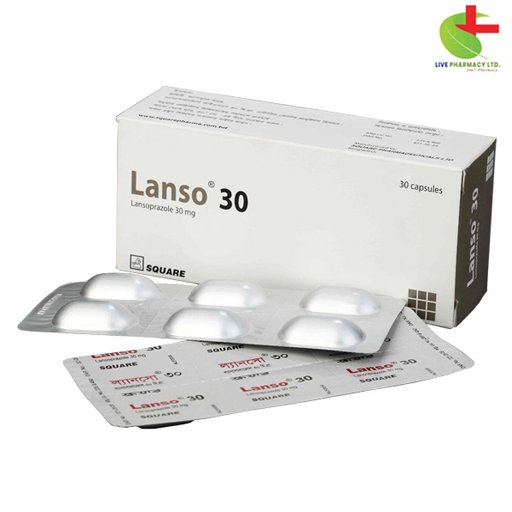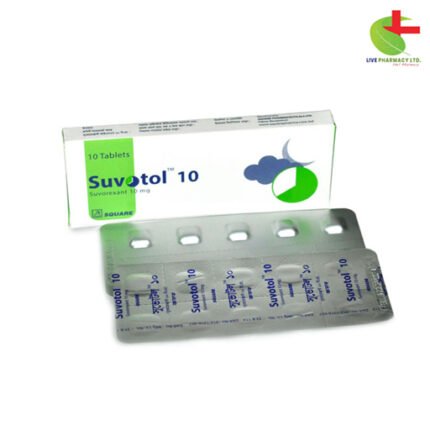Lanso 30
36.24৳ strip
- Discover Lanso, a powerful Proton Pump Inhibitor (PPI) offered by Live Pharmacy, designed to address diverse gastrointestinal ailments.
- From short-term treatment of ulcers to maintaining healing and managing hypersecretory conditions like Zollinger-Ellison Syndrome, Lanso provides comprehensive relief.
- Its mechanism of action involves inhibiting acid secretion, ensuring effective symptom alleviation and promoting tissue healing.
- With precise dosage instructions and considerations for special populations, Live Pharmacy ensures optimal therapeutic outcomes with Lanso.
- Conveniently store Lanso at 25°C for easy access to this trusted gastrointestinal medication.
 Brand
Brand
|
Square Pharmaceuticals PLC |
|---|---|
 Generics
Generics
|
Lansoprazole |
Indications
Lanso serves various therapeutic purposes:
- Short-term treatment of active duodenal ulcers
- Maintenance of healed duodenal ulcers
- Short-term treatment of active benign gastric ulcers
- Short-term treatment of active erosive esophagitis
- Maintenance of healing of erosive esophagitis
- Management of pathological hypersecretory conditions, including Zollinger-Ellison Syndrome
- H. pylori eradication to decrease the risk of duodenal ulcer recurrence
Pharmacology
Lansoprazole, also known as a Proton Pump Inhibitor (PPI), acts as a substituted benzimidazole, blocking the final step of acid secretion by inhibiting the H+/K+ ATPase enzyme system in gastric parietal cells. It effectively inhibits both basal and stimulated acid secretion.
Dosage & Administration
- For benign gastric ulcers: 30 mg once daily in the morning for 8 weeks.
- For duodenal ulcers: 30 mg once daily in the morning for 4 weeks; maintenance dose of 15 mg.
- For NSAID-associated duodenal or gastric ulcers: 15-30 mg once daily for 4 weeks, with an additional 4 weeks if needed.
- For Zollinger-Ellison syndrome and other hypersecretory conditions: Initially 60 mg once daily, adjusted as per response; daily doses of 120 mg or more administered in two divided doses.
- For gastroesophageal reflux disease: 30 mg once daily in the morning for 4 weeks, with an additional 4 weeks if necessary; maintenance dose of 15-30 mg daily.
- For acid-related dyspepsia: 15-30 mg once daily in the morning for 2-4 weeks.
Interaction
Lanso demonstrates selective inhibition of the cytochrome P-450 monooxygenase system, potentially affecting hepatic clearance. However, clinically relevant interactions have not been reported. Uncertainty exists regarding its effect on oral combined contraceptive pills, and ongoing assessment is underway. Physiological changes similar to those seen with Omeprazole may occur due to reduced gastric acid, potentially influencing bacterial colonization in the stomach and duodenum, as well as vitamin B12 absorption.
Contraindications
Lansoprazole is contraindicated in individuals with a known hypersensitivity to any component of the formulation.
Side Effects
Adverse effects may include:
- Possible induction of carcinoid tumors and a rise in serum gastrin levels
- Increased risk of atrophic gastritis with long-term proton pump inhibitor use in H. pylori-infected patients
- Symptomatic effects such as dose-dependent diarrhea (4% at 30 mg/day, rising to 8% at 60 mg/day) and headache (2-3% of treated patients)
Pregnancy & Lactation
Lansoprazole should be avoided during pregnancy unless necessary due to compelling reasons.
Precautions & Warnings
Prior to use, gastric malignancy should be ruled out, and caution is advised in patients with hepatic impairment, pregnancy, and lactation.
Use in Special Populations
- Neonates: Not recommended due to lack of relevant human data.
- Children: Lanso has been used in clinical trials in individuals as young as 13 years old.
- Elderly: No increase in adverse drug reactions has been observed in elderly patients during clinical use.
Therapeutic Class
Proton Pump Inhibitor
Storage Conditions
Store Lanso at 25°C.













Reviews
There are no reviews yet.